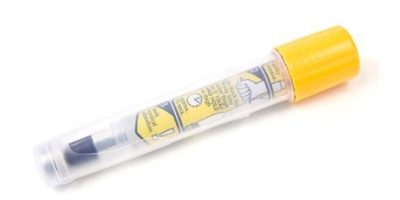EpiPen Lawsuits
People sued the manufacturer of EpiPen and EpiPen Jr devices claiming a defective part prevented them from working as intended. Epipen lawsuits began shortly after the manufacturer recalled tens of thousands of the devices. Lawsuits said the failures resulted in hospitalization, emergency room visits and death. Drugwatch's legal partners are no longer taking Epipen lawsuit cases.
- Legally reviewed by Kimm Massey, Esquire
- Last update: April 23, 2025
In March 2017, the then-manufacturer of Epipens, Meridian Medical Technologies, recalled more than 80,000 EpiPen and EpiPen Jr devices. Leading up to the recall, there had been hundreds of reports that the devices had failed or malfunctioned resulting in life-threatening emergencies.
By the end of 2017, the FDA had received 720 reports of complications involving EpiPens, according to the FAERS Public Dashboard. That was more than double the number of the previous year and accounted for more than a quarter of all EpiPen complications reported since 1993. The complications included more than 200 hospitalizations and at least seven deaths, Bloomberg reported.
As of March 21, 2024, the FAERS Public Dashboard showed 3,968 adverse event reports for the devices. Device failures were the most frequently reported problem. In 2020, the FDA released a safety communication “alerting patients, caregivers and health care professionals that EpiPen 0.3mg and EpiPen Jr 0.15mg auto-injectors, and the authorized generic versions, may potentially have delayed injection or be prevented from properly injecting.”
Lawsuits Claim EpiPens Failed in Life-and-Death Situations
EpiPens are designed to inject a precise dose of epinephrine when people experience a life-threatening allergic or asthmatic attack called anaphylaxis. Lawsuits claim that in some cases the devices either failed to deploy a needle for the necessary shot or the devices emptied the medication before it could be injected. They claim the defective EpiPens were on the market from 2010 through March 2017.
Pharmaceutical company Mylan N.V. had redesigned the device in 2009 — two years after it acquired the rights to it. Mylan N.V. contracted Meridian Medical Technologies, a Pfizer Inc. subsidiary, to manufacture the product. In the years since the redesign, reports of complications filed with the FDA have been significantly higher.
In the 16 years before the redesign, the FDA received a total of 256 adverse event reports. In just the first two years after the redesign, there were 311 reports filed.
- Meridian Medical Technologies
- EpiPen Manufacturer
- Pfizer Inc.
- Meridian’s parent company
- Mylan N.V.
- Marketer and owner of EpiPen’s rights
FDA Warning: EpiPen Maker Failed to Investigate Problems
In September 2017, the FDA accused of Meridian Medical Technologies of failing to properly investigate hundreds of claims about malfunctions and failures.
The FDA sent the manufacturer a warning letter on Sept. 5, 2017, citing “significant violations” of federal regulations.
“Your own data show that you received hundreds of complaints that your EpiPen products failed to operate during life-threatening emergencies, including some situations in which patients subsequently died.”
The agency accused Meridian of being aware of problems with the devices for more than a year but continuing to distribute potentially defective devices.
The FDA also said it had found similar problems in a 2014 inspection of Meridian’s factory, and that the company’s response to correct them had been “inadequate.”
Packaging Problem Could Cause EpiPen Failure, Health Canada Says
In September 2018, Canada’s health regulator warned that a packaging problem with some EpiPens could delay or prevent quick emergency treatment. Health Canada warned that the labels on some of the devices were not applied properly. This could cause them to remain stuck in their tubes.
The affected devices had an expiration date between April 2018 and October 2019.
Pfizer Canada said there was no need to issue a recall. The company said patients should check to see that they can remove the EpiPen from its carrier tube before an emergency happens. The company said it should only affect a small number of devices. But it did not specify exactly how many.
In November 2018, FDA also issued a safety alert warning patients, caregivers and health care professionals that labels on some “EpiPen 0.3mg and EpiPen Jr 0.15mg auto-injectors, and the authorized generic versions, may block access to the auto-injector and prevent the ability to easily access the product.”
EpiPen Pricing Lawsuit Settlements
In August 2017, Mylan agreed to a $465 million settlement in a whistleblower lawsuit. The U.S. Justice Department and several states claimed the company overcharged Medicaid for EpiPens. As part of the settlement, Mylan did not have to admit any wrongdoing.
The settlement came as Mylan faced growing complaints about skyrocketing price hikes for EpiPens. Between 2007 and 2016, Mylan increased the price of a two-pack of EpiPens from less than $100 to more than $600.
Pfizer agreed to pay $345 million to resolve an EpiPen pricing lawsuit in July 2021. In February 2022, Viatris, formerly known as Mylan, agreed to pay $264 million to resolve a class action lawsuit alleging it engaged in a scheme to delay generic competition.
By 2017, there were five class action lawsuits over EpiPen pricing. In August 2017, a federal panel closed all five and transferred the cases to U.S. District Court for the District of Kansas as part of a new multidistrict litigation (MDL). The Kansas MDL does not deal with injuries from malfunctioning EpiPens but with claims Mylan manipulated prices that hurt consumers.
The companies sought to have the MDL dismissed, but in August 2018, the judge allowed the action to go forward on many of the plaintiffs’ claims. In July 2022, a judge approved a $264 million settlement to resolve claims regarding EpiPen pricing and the MDL was closed.
Calling this number connects you with a Drugwatch.com representative. We will direct you to one of our trusted legal partners for a free case review.
Drugwatch.com's trusted legal partners support the organization's mission to keep people safe from dangerous drugs and medical devices. For more information, visit our partners page.



